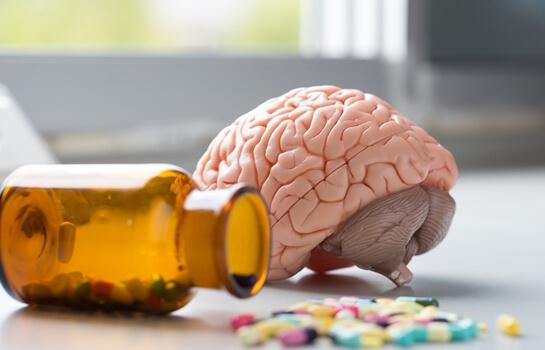Your Brain and Vitamin D: Why You Need Sun


Written and verified by the psychologist Valeria Sabater
Your brain and vitamin D: did you know your brain needs sunlight? Vitamin D doesn’t just protect your bones but also protects your neurons and helps you synthesize minerals. There are many people who have a vitamin D deficiency without knowing it. In fact, it is estimated that almost 60% of people between 50 and 60 years old are low in it. In fact, 80% of the elderly population has a deficiency.
There are two main reasons. The first is that as we grow older, we stop synthesizing it so easily. The second is related to lifestyle habits. Vitamin D is synthesized through the skin out of sunlight. We can also obtain it through the foods we eat, especially dairy products.
There are hundreds of reasons you might not be getting enough sunlight. And if you’re lactose intolerant or don’t like dairy products, then you won’t have enough vitamin D and your body — and brain — will notice.

Your brain and vitamin D
Difficulty concentrating and thinking, memory loss, retaining new information… All of these are processes associated with vitamin D deficiency. We sometime overlook these neurological symptoms (although there are many possible causes for them).
Most people know about its link with calcium, strong bones and osteoporosis. Well, the relationship between the brain and vitamin D has also been known for a few decades.
- Vitamin D activates and deactivates enzymes in the brain and cerebrospinal fluid involved in synthesizing neurotransmitters and nerve growth.
- Vitamin D protects neurons and reduces inflammation.
- A study conducted by neuroscientist David Llewellyn at the University of Cambridge showed that with lower levels of vitamin D, people did worse in agility and mental performance tests.
- We process information more slowly and with more difficulty if we don’t have enough vitamin D.
Symptoms of a vitamin D deficiency
If we lack vitamin D, the symptoms won’t be obvious at first. They are often attributed to other disorders and conditions, and even to aging. But we need to invest in our health as we age. We should hope that the fabulous workings of our brain can get to old age in good shape.

Let’s see now possible symptoms of vitamin D deficiency:
- Fatigue.
- Muscule weakness.
- Hip and back pain.
- Problems concentrating.
- Memory loss.
- Problems retaining new information.
How can we get enough vitamin D?
Certain foods have been enriched with vitamin D ever since the relationship between the brain and vitamin D was established. Milk, yogurt, and cereal are usually fortified with it. But let’s look at other good sources of vitamin D.
- Sunbathing every day for half an hour (avoiding peak hours when the sun’s rays are harmful).
- Salmon.
- Tuna.
- Sardines.
- Oysters.
- Chanterelles (mushroom).
- Shiitake mushrooms.
- Cheese.
- Milk.
- Eggs.
- Chickpeas.
- Almonds.
- Broccoli.
- Agar agar (algae).

To conclude, given the relationship between the brain and vitamin D, you may want to see your doctor to make sure your levels are ok. Before taking vitamin supplements on your own, always get expert advice.
Having good levels of vitamin D will strengthen your body’s immune response. It will help you handle daily stress better. It’s so important for both your body and mind, so make sure you’re getting enough!
Your brain and vitamin D: did you know your brain needs sunlight? Vitamin D doesn’t just protect your bones but also protects your neurons and helps you synthesize minerals. There are many people who have a vitamin D deficiency without knowing it. In fact, it is estimated that almost 60% of people between 50 and 60 years old are low in it. In fact, 80% of the elderly population has a deficiency.
There are two main reasons. The first is that as we grow older, we stop synthesizing it so easily. The second is related to lifestyle habits. Vitamin D is synthesized through the skin out of sunlight. We can also obtain it through the foods we eat, especially dairy products.
There are hundreds of reasons you might not be getting enough sunlight. And if you’re lactose intolerant or don’t like dairy products, then you won’t have enough vitamin D and your body — and brain — will notice.

Your brain and vitamin D
Difficulty concentrating and thinking, memory loss, retaining new information… All of these are processes associated with vitamin D deficiency. We sometime overlook these neurological symptoms (although there are many possible causes for them).
Most people know about its link with calcium, strong bones and osteoporosis. Well, the relationship between the brain and vitamin D has also been known for a few decades.
- Vitamin D activates and deactivates enzymes in the brain and cerebrospinal fluid involved in synthesizing neurotransmitters and nerve growth.
- Vitamin D protects neurons and reduces inflammation.
- A study conducted by neuroscientist David Llewellyn at the University of Cambridge showed that with lower levels of vitamin D, people did worse in agility and mental performance tests.
- We process information more slowly and with more difficulty if we don’t have enough vitamin D.
Symptoms of a vitamin D deficiency
If we lack vitamin D, the symptoms won’t be obvious at first. They are often attributed to other disorders and conditions, and even to aging. But we need to invest in our health as we age. We should hope that the fabulous workings of our brain can get to old age in good shape.

Let’s see now possible symptoms of vitamin D deficiency:
- Fatigue.
- Muscule weakness.
- Hip and back pain.
- Problems concentrating.
- Memory loss.
- Problems retaining new information.
How can we get enough vitamin D?
Certain foods have been enriched with vitamin D ever since the relationship between the brain and vitamin D was established. Milk, yogurt, and cereal are usually fortified with it. But let’s look at other good sources of vitamin D.
- Sunbathing every day for half an hour (avoiding peak hours when the sun’s rays are harmful).
- Salmon.
- Tuna.
- Sardines.
- Oysters.
- Chanterelles (mushroom).
- Shiitake mushrooms.
- Cheese.
- Milk.
- Eggs.
- Chickpeas.
- Almonds.
- Broccoli.
- Agar agar (algae).

To conclude, given the relationship between the brain and vitamin D, you may want to see your doctor to make sure your levels are ok. Before taking vitamin supplements on your own, always get expert advice.
Having good levels of vitamin D will strengthen your body’s immune response. It will help you handle daily stress better. It’s so important for both your body and mind, so make sure you’re getting enough!
This text is provided for informational purposes only and does not replace consultation with a professional. If in doubt, consult your specialist.







